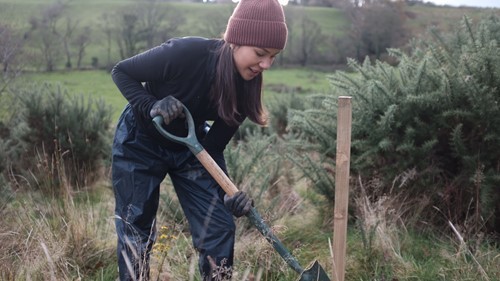Leading bulk materials handling specialist Spiroflow has become one of the small percentage of UK manufacturing businesses to achieve carbon neutrality - a status achieved by calculating a carbon footprint and reducing it to zero through a combination of in-house efficiency measures and supporting external emission reduction projects. The company’s latest activity was a tree planting event held at Lancaster University’s Forrest Hills.
Spiroflow was participating in Lancaster University’s ‘Forest of the Future’ initiative, an annual tree planting project held on university-owned land that provides the university and local SMEs with the opportunity to completely offset their carbon emissions for the year by planting a quantity of trees - the number depending on their carbon footprint. In Spiroflow’s case, a total of 250 native trees including oak, aspen, beech and blackthorn were planted by a team of 10 employees, to offset 131 tonnes of carbon emitted by the company during 2019.
As a starting point in reducing its environmental impact, the company needed to understand its ‘carbon baseline’, i.e. its overall carbon impact. This was achieved by participating in a Low Carbon Innovation Forum run by Lancaster University’s Management School and working closely with specialists from the Making Carbon Work (MaCaW) project, an industry and academic collaboration, funded by the European Development Fund (ERDF) and supported by Boost - Lancashire’s business growth hub. By quantifying their complete operation, the project was able to benchmark Spiroflow’s energy performance and calculate their annual carbon emissions.
“Once we fully understood what our carbon impact was, we were better placed to do something about it,” said Spiroflow’s development engineer, Craig Hollings. “The first step was a grass roots approach to make small changes; this included changing plastic cups in the canteen to water bottles for a more sustainable use, changing lighting over to LED, monitoring heating and increasing the recycling of cardboard waste. The tree planting event has been a great way to achieve our goal of becoming carbon neutral and we are delighted to have secured agreements with landowners for future tree planting initiatives to last in excess of 50 years.”
Darren Axe, Lancaster University Students’ Union development manager (environmental sustainability), added: “Earlier this year, Spiroflow looked at the possibility of getting involved in tree planting at Lancaster as part of the ‘Forest of the Future’ initiative. The aim was to trial a mechanism to assist Spiroflow with compensating for the annual carbon emissions associated with their operations. Following some carbon accounting undertaken by Spiroflow, it was identified that Spiroflow would need to plant 250 trees in order to sequestrate (over the lifetime of the tree) the carbon associated with their emissions in 2019. This set the scene for a planting day at Forrest Hills on 23rd November - it was great to see all of these trees planted by the team at a very enjoyable Saturday session!”
Spiroflow has also focused on finding other ways of reducing their environmental impact. By optimising transport load plans, they have been able to reduce shipping costs and ultimately the amount of transport and fuel used in their supply chain. Elsewhere, journeys made by sales managers in visiting customers was also reviewed and an augmented reality app was deployed to help reduce business mileage in this key area. The ‘app’ means that sales managers now have the capability to facilitate an immersive experience for customers, similar to being in front of the company’s equipment, but without using the fuel to get to site.
In a separate initiative, Spiroflow is providing customers with an opportunity to reduce their own carbon emissions through its recently launched remote monitoring system called SAM. As the system provides customers with full visibility of the energy consumption of their equipment, they are able to make fundamental changes to their processes to reduce their carbon impact where necessary.
Spiroflow designs powder handling systems, including specialised conveyors and bulk bag handling equipment for the food, chemical, minerals and other process industries. Spiroflow also manufactures bin activators, Aero Mechanical Conveyors, Tubular Cable and Drag Chain Conveyors, Vacuum Conveyors, Bulk Bag Fillers, Ingredients Handling and Weighing Systems.
The company’s technical and engineering expertise has led to it developing an international reputation for an unrivalled range of products with state-of-the-art control systems.























